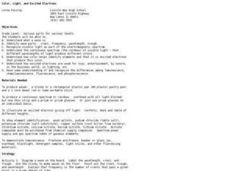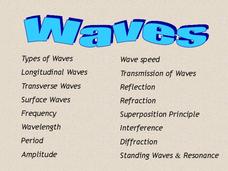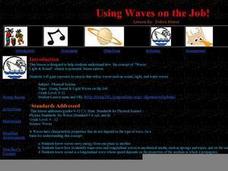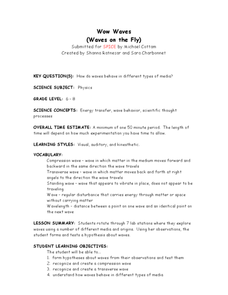Curated OER
Measures of Circular Motion
Physicists become Olympians in a competition using centripetal force. They ride a bicycle to comprehend relationships between linear and rotational motion. If you have an old-fashioned record player, it can be used to help pupils...
Curated OER
Color, Light, and Excited Electrons
Investigate color, light and excited electrons and produce waves using slinkys. Your high schoolers will observe a continuous spectrum with a prism and an overhead projector. They observe flame tests to identify elements and they observe...
Curated OER
Waves
Light waves and sound waves are the focus of this science lesson designed for 5th graders. Besides discovering how these waves travel, learners also discover the basic properties of waves, and analyze data tables and graphs. The...
Curated OER
Waves
Although this was written to accompany a specific textbook, the information can illustrate wave motion for any advanced level physics course. The slides are simple, use plain but colorful fonts, and include diagrams and pictures to...
Curated OER
What Causes Big Waves?
Students use the internet to research how waves are formed. Using construction paper, they create a diorama in which they can see how waves are formed and end. To end the lesson plan, they also discuss the causes and effects of...
Curated OER
Using Waves on the Job!
A colorful and comprehensive PowerPoint highlights this lesson on waves. Junior geophysicists pretend that they are hired to analyze seismic waves. A worksheet is provided to go along with an online article about how compact discs work...
Curated OER
Seas in Motion
Students analyze wave movement. In this Science lesson, students use items that float to observe waves and currents. Students record and discuss their observations.
Curated OER
Waves and Currents
Young scholars are introduced to the forces that are responsible for generating waves in the ocean and how these forcesf differ from those that cause currents. They are able to explain how water molecules in a wave do not move in the...
Curated OER
Two Source Interference
The paths of waves generated from two different points are shown here on a sequence of slides. The lengths and directions are labeled, step-by-step. Finally, path interference is shown along with the calculations that your physics...
Curated OER
Catch a Wave
Students study low tides and how to calculate for fresh water. For this ocean science lesson, students pretend they are stranded on an island and must calculate low tide in order to source the fresh water aquifer. Students calculate how...
Curated OER
Ocean Waves and Tides
Except for a few blurry photos that you can leave out, this is a succinct, yet purposeful presentation. It explains what causes ocean waves, the parts of a wave, and how they break against a shore. It details the cause of tides and...
Curated OER
Marine Biology - The Story of Waves
When teaching about the movement of water in the ocean, this PowerPoint will be a terrific support. It covers how waves break and how they are generated. The causes of tides and tsunamis are also detailed. A couple of changes could make...
Curated OER
Science Jeopardy
Water, currents, waves, salt marshes, and The Chesapeake Bay make up the categories for this Jeopardy-style game. In terms of functionality, it works well. However, it is unlikely that you focus on the Chesapeake Bay as part of your...
Curated OER
Understanding Waves
Students examine the physical properties of waves to explore the word crest and trough. They use toys to study waves in air, water and light.
Curated OER
Rhythmic Movement
Explore how waves move in the ocean with your young learners. Fill a two-liter bottle half full with colored water, and have the youngsters move the bottle to make waves inside of it. Then have them listen to the song "Wipe Out"....
Curated OER
Wave Properties
Use this slideshow to explain waves. Energy travelling in waves and its behavior in different materials are explained. The diagrams and equations will assist your students in defining wave type and explaining the differences...
Curated OER
Waves: the Nature of Waves
Each of the slides has some information or a few definitions about the travel of energy through different media. There are references given to obtain further information, which makes this slideshow a great tool for introduction or...
Curated OER
Review of Oscillations
In this oscillations worksheet, students complete 50 multiple choice questions on forces, motion, periodic motion and simple harmonic motion.
Curated OER
Wow Waves (Waves on the Fly)
Students formulate hypotheses on wave behavior and test them. In this physics lesson, students compare and contrast transverse and compression waves. They determine the wavelength of transverse waves.
Curated OER
Applied Science - Physics (5A) Pre Lab
Fifth graders look at different types of waves. In this wave lesson, 5th graders find the difference and similarities of electromagnetic and physical waves. They review the components of waves such as crest, trough, wavelength, and wave...
Curated OER
Dynamic Earth
Students show how earthquakes affect sea waves. In this tidal waves lesson students use a rubber mallet on a table to create waves in a box on top of the table. They experiment with striking the mallet in different locations on the...
Curated OER
Ocean in Motion
In this ocean in motion worksheet, learners complete a crossword puzzle given 21 clues about waves, currents, the tides, winds, and surface water.
Curated OER
Standing Waves
In this standing waves worksheet, high schoolers read about standing waves, their nodes, their anti-nodes and their wavelengths. They are given diagrams of harmonics and the equation to find the frequency of harmonics. Students match...
Curated OER
Sound
In this sound worksheet, students read about sound waves, how they are graphed, what frequency is and how it's related to pitch and the speed of sound. Students solve 8 sections of problems including matching terms related to sound to...

























